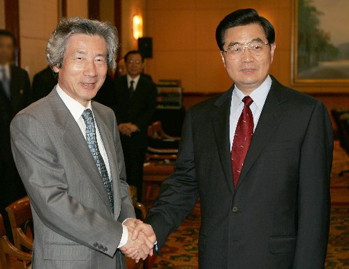
Chinese President Hu Jintao on Sunday urged Japan to properly treat its war
time history with an eye to the future, and called for a halt to visits by
Japanese leaders to a shrine honoring World War II criminals.
In a meeting with Japanese Prime Minister Junichiro Koizumi after the
conclusion of the 12th Economic Leaders' Meeting of the Asia-Pacific Economic
Cooperation (APEC) forum, Hu said Sino-Japanese ties should be strengthened and
the leaderships of both countries should actively promote bilateral relations
from a strategic point of view.
Sino-Japanese relations have made considerable headway since the two
countries established diplomatic ties 32 years ago, Hu said, adding that
cooperation in many fields have yielded fruits.
Today's bilateral ties are no easy achievement and should be highly valued
and cherished by both sides, he said.
The development of a long-term friendly Sino-Japanese relationsis of greater
significance today than ever before, and the leaderships of both countries
should keep their eye to the future and actively push for a steady and sound
development of bilateral ties.
In order to achieve this, Hu put forward three guidelines:
-- Both countries should strictly abide by the three political documents
signed by the two governments and promote exchanges and cooperation from a broad
point of view and in the spirit of "taking history as a mirror and looking into
the future";
-- The two sides should improve coordination and cooperation inregional and
international affairs;
-- The two countries should enhance cooperation in energy, environmental
protection and other areas, while continuing to deepen cooperation in trade.
Hu pointed out that the core problem staying in the way of the development of
bilateral ties is Japanese leaders' visits to the controversial Yasukuni Shrine
in Tokyo which honors convicted war criminals.
The Chinese government hopes the Japanese side will properly handle the issue
and prevent bilateral ties from suffering unwanted damages, Hu said.
The longer the issue lingers, the more seriously it will hurt the feelings of
the people of China and other countries which had suffered enormously during the
Japanese aggression in the past, Husaid.
He said a statesman should take a responsible attitude toward the war time
history and bear in mind the greater picture of forging friendly bilateral ties
and contributing to peace and development in Asia.
Hu reiterated the Chinese government's stance on Taiwan and expressed his
appreciation to the Japanese government's adherence to the one-China policy and
pledge of non-support for "Taiwan independence."
Speaking on the same occasion, Koizumi said he is convinced that China's
development is an opportunity rather than a threat, adding that this has been
recognized by more and more people.
He said he hopes China keeps its growth momentum, which will be beneficial to
Japan and the world as a whole.
The Japanese government attaches great importance to its relations with China
and hopes to constantly promote the mutually-beneficial cooperation with China
in various fields, he said.
Koizumi said he recognizes the importance of "taking history asa mirror" and
considers it important to reflect on the war time history and to view the
Japanese-Chinese relations in a historicalperspective. Japan will never launch a
similar war, he said.
On his visits to Tokyo's Yasukuni Shrine, Koizumi said he understands China's
stance on the issue.
The Japanese prime minister also reaffirmed Japan's commitment to the
one-China policy and vowed not to support "Taiwan independence."
The two leaders also exchanged views on other issues of mutual concern.
Yasukuni Shrine honors 14 Class-A World War II criminals along with Japanese
war dead since the mid-19th century. Koizumi has paid four visits to the shrine
since he took office in 2001, with the latest one in January.
Despite strong protests from China, Koizumi insisted that he will continue
the annual visit to Yasukuni shrine.



